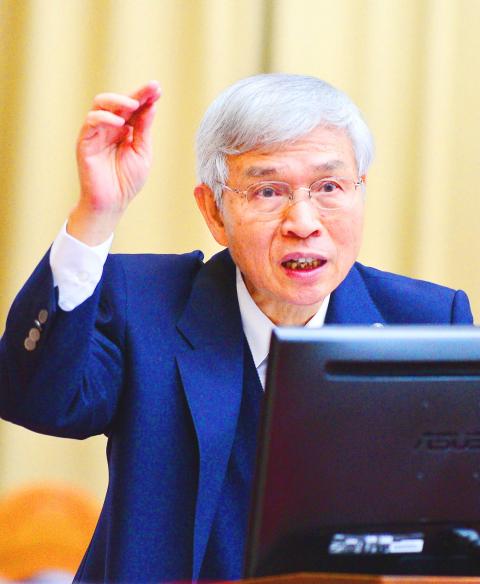Central bank Governor Yang Chin-long (楊金龍) yesterday said the bank would remove authoritarian icons from the nation’s currency if explicit orders were given by the transitional justice promotion committee to be established by the Executive Yuan.
Yang made the remark at a meeting of the Legislative Yuan’s Finance Committee, after Chinese Nationalist Party (KMT) Legislator Lai Shyh-bao (賴士葆) asked whether the passage of the Act on Promoting Transitional Justice (促進轉型正義條例) would prompt changes to the design of the nation’s currency.
Although the act was promulgated last year, the central bank cannot make changes before the transitional justice promotion committee specifies which banknotes or coins contain authoritarian imagery, Yang said.

Photo: Wang Yi-sung, Taipei Times
The act stipulates that the Cabinet is to create the nine-member transitional justice promotion committee to oversee the removal of authoritarian icons, the declassification of state archives and the rehabilitation of victims of persecution.
The committee is to be disbanded upon completing a full report on those tasks, the act says.
“Should the transitional justice promotion committee order a change to the design of the New Taiwan dollar, I believe we will have to discharge our duties according to the law,” Yang said.
Lai then asked Yang whether his comments could be interpreted as an unwillingness to follow the policy of his predecessor, former central bank governor Perng Fai-nan (彭淮南).
Lai also asked Yang whether he agrees that changing the design of the currency — which Lai said would cost NT$50 billion (US$1.7 billion) — would be a waste of taxpayer money for political purposes.
Yang responded to both questions in the negative, saying that the central bank decided during Peng’s tenure as governor that it would not change clearly apolitical and nonauthoritarian design elements of the currency.
In response to a question by Democratic Progressive Party (DPP) Legislator Liu Chien-kuo (劉建國), Yang said that the central bank does not currently have, or has ever had, a fixed limit on the upward movement of the NT dollar versus the US dollar.
Monetary policy observers have long called the exchange rate of NT$28.5 per US dollar the “Perng Fai-nan Line,” Li said, before asking Yang where he would draw the line on the NT dollar’s appreciation.
“I have followed Perng for a long time and I have never heard him say that we should hold this or that line in defense of our currency’s exchange rate,” Yang said.
The central bank would intervene and keep order if and when abnormal fluctuations occur in the market, he added.
Trying to reverse significant exchange rate fluctuations by force is counterproductive, Yang said, adding that the central bank favors a flexible approach to monetary policy.
The market yesterday appeared to respond to Lai’s comments by testing the central bank’s bottom line, with the NT dollar appreciating NT$0.057 to NT$29.200, its highest level since Jan. 31, when it reached NT$29.150.
The NT dollar yesterday opened at NT$29.245, moving between NT$29.180 and NT$29.250 before the close.

CHIP WAR: The new restrictions are expected to cut off China’s access to Taiwan’s technologies, materials and equipment essential to building AI semiconductors Taiwan has blacklisted Huawei Technologies Co (華為) and Semiconductor Manufacturing International Corp (SMIC, 中芯), dealing another major blow to the two companies spearheading China’s efforts to develop cutting-edge artificial intelligence (AI) chip technologies. The Ministry of Economic Affairs’ International Trade Administration has included Huawei, SMIC and several of their subsidiaries in an update of its so-called strategic high-tech commodities entity list, the latest version on its Web site showed on Saturday. It did not publicly announce the change. Other entities on the list include organizations such as the Taliban and al-Qaeda, as well as companies in China, Iran and elsewhere. Local companies need

CRITICISM: It is generally accepted that the Straits Forum is a CCP ‘united front’ platform, and anyone attending should maintain Taiwan’s dignity, the council said The Mainland Affairs Council (MAC) yesterday said it deeply regrets that former president Ma Ying-jeou (馬英九) echoed the Chinese Communist Party’s (CCP) “one China” principle and “united front” tactics by telling the Straits Forum that Taiwanese yearn for both sides of the Taiwan Strait to move toward “peace” and “integration.” The 17th annual Straits Forum yesterday opened in Xiamen, China, and while the Chinese Nationalist Party’s (KMT) local government heads were absent for the first time in 17 years, Ma attended the forum as “former KMT chairperson” and met with Chinese People’s Political Consultative Conference Chairman Wang Huning (王滬寧). Wang

CROSS-STRAIT: The MAC said it barred the Chinese officials from attending an event, because they failed to provide guarantees that Taiwan would be treated with respect The Mainland Affairs Council (MAC) on Friday night defended its decision to bar Chinese officials and tourism representatives from attending a tourism event in Taipei next month, citing the unsafe conditions for Taiwanese in China. The Taipei International Summer Travel Expo, organized by the Taiwan Tourism Exchange Association, is to run from July 18 to 21. China’s Taiwan Affairs Office spokeswoman Zhu Fenglian (朱鳳蓮) on Friday said that representatives from China’s travel industry were excluded from the expo. The Democratic Progressive Party government is obstructing cross-strait tourism exchange in a vain attempt to ignore the mainstream support for peaceful development

ELITE UNIT: President William Lai yesterday praised the National Police Agency’s Special Operations Group after watching it go through assault training and hostage rescue drills The US Navy regularly conducts global war games to develop deterrence strategies against a potential Chinese invasion of Taiwan, aimed at making the nation “a very difficult target to take,” US Acting Chief of Naval Operations James Kilby said on Wednesday. Testifying before the US House of Representatives Armed Services Committee, Kilby said the navy has studied the issue extensively, including routine simulations at the Naval War College. The navy is focused on five key areas: long-range strike capabilities; countering China’s command, control, communications, computers, cyber, intelligence, surveillance, reconnaissance and targeting; terminal ship defense; contested logistics; and nontraditional maritime denial tactics, Kilby